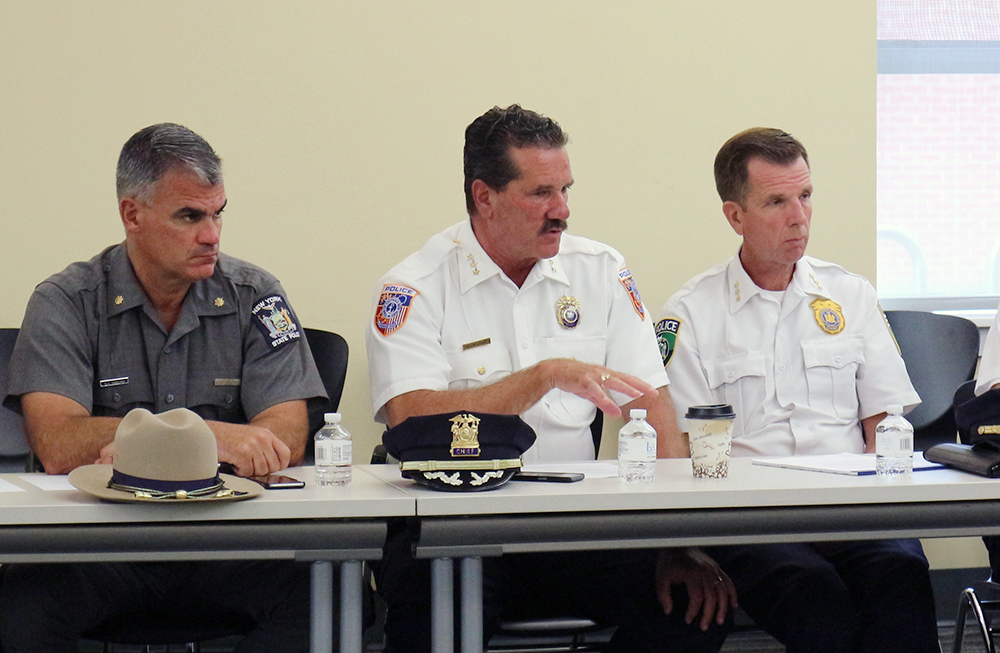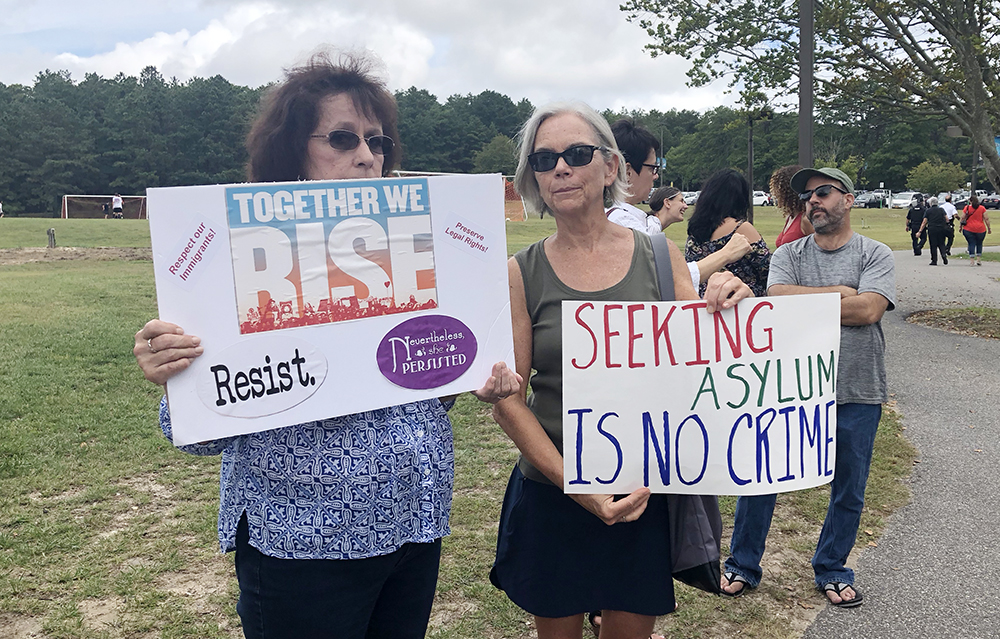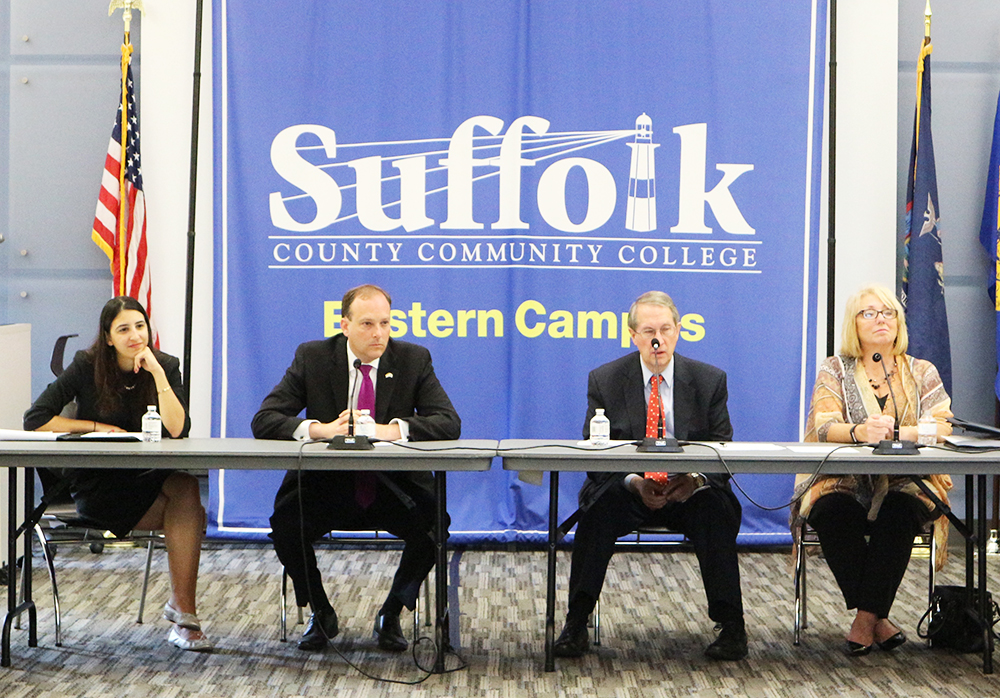At an immigration forum, voices call for help and progress

A roundtable discussion Monday on the nation’s immigration system brought law enforcement, farmers and the parents of a 16-year-old boy slain by MS-13 together at Suffolk County Community College in Riverhead.
Each group discussed a different facet of the controversial issue at the forum, which was hosted by Congressman Lee Zeldin (R-Shirley). Local law enforcement and their federal partners discussed the gang violence plaguing western Suffolk County, drug and human trafficking. Representatives from the Long Island Farm Bureau pleaded for changes to the visa program in order to sustain their workforce. And the parents of Justin Llivicura, one of four teenagers slain by MS-13 gang members in Central Islip last year, spoke about fear in the immigrant community.
“This administration has taken a hard stance against gang violence,” Mr. Zeldin said, adding that the forum was meant to glean from the different agencies what more could be done on the issue. President Donald Trump has visited Long Island twice in the last year to discuss MS-13 gang violence.
Southold Police Chief Martin Flatley said prevention tactics in schools is an important tool to discourage gang involvement. “It’s our way of confronting the recruitment areas of vulnerable teenagers that are in school,” he said.
This year, Southold police tripled their police presence in town schools, from one school resource officer to three. “The more we have a presence, the better,” he said.
Mr. Zeldin focused much of the discussion on the influx of unaccompanied minors to Suffolk County, which he said provided “fertile recruiting opportunities,” for gangs like MS-13.
According to SCPD chief detective Gerard Gigante, 2016 was a “turning point,” in the national conversation on gang violence when 11 murders in the county were linked to MS-13.

Since 2014, 5,000 unaccompanied minors have been placed throughout Suffolk County, Det. Gigante said, adding that they are especially vulnerable to gang recruitment.
“They’re young, alone and adjusting to a new country, culture, language and seeking a sense of belonging,” he said, adding that the current vetting and screening process for sponsors is in “dire” need of improvement.
He said local law enforcement agencies should be involved in the vetting process to help curb gang recruitment — and that agencies should follow up on the youths.
“We can help mitigate problems associated with sponsors if we’re invited to that table,” he said.
Congressman Bob Goodlatte (R-VA), Chair of the House Committee on the Judiciary, said he thought that was a great idea, and exactly the point of this kind of meeting. He was in attendance.
Law enforcement officials from Southold and Shelter Island all the way up to the Department of Homeland Security and ICE discussed how drug and human trafficking were affecting Suffolk County. Det. Gigante said the county was currently connecting East End police departments to the Long Island Satellite Intelligence Center (L.I.S.I.C.), a network that allows intel to be shared amongst agencies.
But the focus of the meeting was not entirely gang-related. Mr. Zeldin and Mr. Goodlatte also asked to hear from the farming industry, noting that changes to the immigration system must take into account the workforce employed by the farming, construction and hospitality industries.
The Long Island Farm Bureau, represented by administrative assistant Rob Carpenter and president Karl Novak, called for meaningful changes to the temporary worker program.
Mr. Novak said he’s worked with immigrants of all nationalities — Polish, Mexican, Guatemalan — over the course of his 40-year farming career.
“They’re hardworking, honest people pursuing the American dream, and many of them have achieved it,” Mr. Novak said.

But bureaucracy and red tape, Mr. Carpenter said, make the process of employing a workforce cumbersome. He called for a program that can be “adoptable to the needs of our different communities without putting additional burdens on our operations with more regulation, time and effort or stipulations that could hurt our business profitability.”
Mr. Goodlatte agreed.
In July, he put forth the Ag and Legal Workforce Act to replace the current H-2A visa program and would require all employers — farmers included — to verify their workers are legally in the country. The visas issued would be valid for three years.
“We need people to be able to be here for extended periods of time but still be guest workers,” Mr. Goodlatte said during the meeting. “They can come back and forth across the border legally, to visit family.”
He said an important focus was ensuring that agricultural and other businesses have a viable workforce.
“Those workers are going to be from other countries,” he said. “We do not have the workforce in the United States to meet those needs.
Missing from the table were Suffolk County Sherrif Errol Toulon and District Attorney Tim Sini, who were invited but did not attend Monday’s discussion.
Outside, a group of over 50 people gathered to protest the discussion, which was not open to the public and was criticized for excluding immigration activists.
Minerva Perez, executive director of Organización Latino-Americana of Eastern Long Island, said there should have been a seat at the roundtable discussion for Long Island activist groups.
“Our main concern is the constant twisting of this narrative that immigrants equal violent members of our community,” she said outside of the Montaukett Learning Resource Center, where the discussion was held. “If it was really about protection, we’d be protecting immigrants who are usually the victims of gang violence anyway,” Ms. Perez said.
Justin Llivicura’s parents would attest to that.
Speaking through a translator, they told reporters that they live in fear for their daughters, and called on law enforcement to keep immigrant communities safe.
“Out of something bad, they want to see some good. They want to see their son’s name remembered,” said Jaime Hechtman-Ulloa, founder of Hope 4 Immigrants Coalition of LI, Inc. who translated for the couple.
Ms. Hechtman-Ulloa also addressed the fear shared among the immigrant community.
“People are afraid to come forward because they’re afraid of the gang retribution,” she said. “[MS-13] gets their power through violence, they keep them in fear,” she said.
She said both legal and undocumented immigrants are fearful of reporting crimes, including gang activity or domestic violence. “Law enforcement agencies are working together to be able to help [immigrants] come forward and not be fearful,” she said.
Amy Turner of East Hampton based Progressive East End Reformers (PEER) said she was disappointed the forum was not public.
“It only represented a limited, law-enforcement perspective,” on the issues, she said.
In response, Mr. Zeldin said the meeting was intended to be focused on law enforcement since the House Judiciary Committee was represented.
He said the purpose was to have “productive, substantive” conversations on immigration.
“There will always be someone who would like to attend in order to disrupt the meeting,” he said, adding that he thought the morning’s discussion marked real progress.
“It was really important to have the Long Island Farm Bureau here since they advocate strongly for the right policies not just for the business owners but also for their employees,” he said.
Mr. Zeldin also said that the East End is “fortunate” that gang activity has been minimal compared to western Suffolk. “[It shows] the need for us to be on offense and defeat MS-13,” he said.









